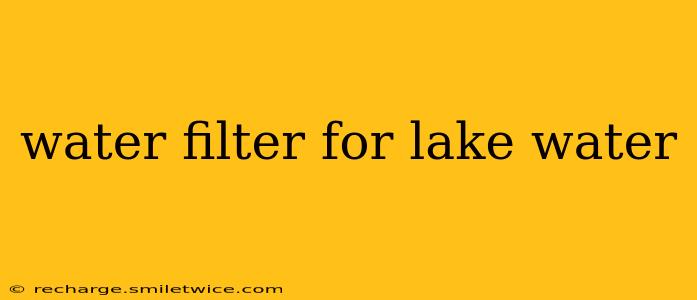Lake water, while visually appealing, often harbors unseen contaminants that can pose serious health risks. From bacteria and parasites to sediment and dissolved minerals, ensuring safe drinking water from a lake requires a robust filtration system. This guide dives deep into selecting the right water filter for your needs, addressing common concerns and helping you make an informed decision.
What are the main contaminants found in lake water?
Lake water contamination varies greatly depending on the lake's location, surrounding environment, and human activity. Common contaminants include:
- Bacteria and Viruses: These microscopic organisms can cause various waterborne illnesses. E. coli and other pathogens are significant concerns.
- Parasites: Giardia and Cryptosporidium are common parasites found in lake water, leading to gastrointestinal distress.
- Sediment: Sand, silt, and clay particles cloud the water and can impact taste and appearance.
- Dissolved Minerals: Excessive minerals like calcium, magnesium, and iron can alter the taste and potentially contribute to health issues.
- Pesticides and Herbicides: Runoff from agricultural lands can contaminate lakes with harmful chemicals.
- Algae and other organic matter: Decaying organic materials can affect water quality and taste.
What type of water filter is best for lake water?
No single "best" filter exists, as the ideal choice depends on the specific contaminants present and your desired level of purification. However, several filter types excel at treating lake water:
-
Gravity Filters: These affordable options are suitable for smaller volumes of water and primarily remove sediment and larger particles. They are not effective against bacteria, viruses, or most dissolved minerals.
-
Ceramic Filters: These filters use a porous ceramic element to remove sediment and some bacteria. While relatively inexpensive, they may not be sufficient for heavily contaminated water.
-
Carbon Filters: These filters employ activated carbon to absorb chlorine, unpleasant tastes and odors, and some organic compounds. They are often used in conjunction with other filter types.
-
Ultrafiltration (UF) Filters: UF filters remove bacteria, viruses, and cysts using a membrane with very small pores. They are more effective than ceramic filters but still may not remove all dissolved minerals.
-
Reverse Osmosis (RO) Filters: RO filters are the most thorough, removing a wide range of contaminants, including dissolved minerals, salts, and heavy metals. However, they are more expensive and require a steady supply of water pressure.
-
UV Sterilizers: UV light effectively kills bacteria and viruses, often used in conjunction with other filters for a comprehensive purification system.
How much water can I filter per day?
The daily filtration capacity varies significantly depending on the type and size of the filter. Small gravity filters might process only a few liters per day, while larger systems, including some RO units, can handle several gallons. Always check the manufacturer's specifications to determine the appropriate filter for your water consumption needs.
What is the lifespan of a lake water filter?
Filter lifespan depends on several factors, including the water quality, usage frequency, and the filter's design. Many filters have replacement cartridges or elements that need replacing periodically, typically every few months to a year. Regularly check your filter's instructions for maintenance schedules and replacement guidelines.
How do I maintain my lake water filter?
Proper maintenance prolongs your filter's life and ensures optimal performance. Regularly clean or replace filter cartridges according to the manufacturer's instructions. For some filter types, periodic backwashing or flushing may be necessary to remove accumulated sediment.
Is it safe to drink lake water after filtering?
While filtration significantly improves water safety, it's crucial to remember that no filter guarantees 100% purity. Always select a filter appropriate for the contaminants present in your lake water. If you have concerns about your water's safety, consider testing it regularly at a certified laboratory. In areas with known water contamination issues, boiling the filtered water is an added safety precaution. Ultimately, choosing the right water filter for your lake water necessitates careful consideration of your specific needs and local water conditions.
